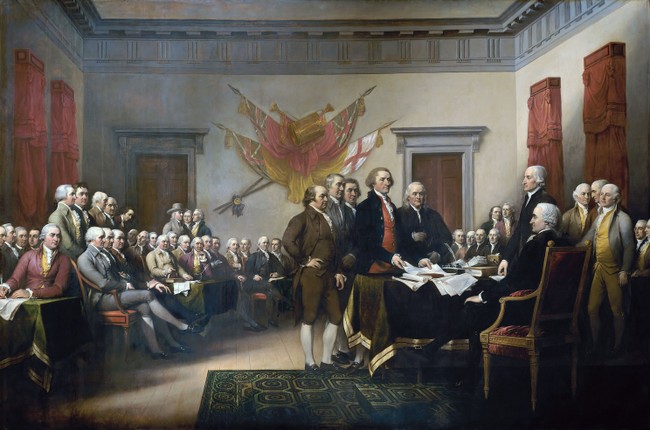


July 4, 1776, is considered the birthday of America. It is the day on which the Declaration of Independence was approved for public release, founding a new nation on liberty, equality, and justice. The world would never be the same.
King George III of Britain and Parliament had for years been infringing on Americans’ rights, unjustly taxing and penalizing them, ignoring all pleas for reform, and sneering disdainfully at those colonists who murmured about independence. Finally, American Patriots had had enough. The Continental Congress voted for independence, Patriots across the colonies cheered the move, the colonial army took up their cause with renewed vigor, and a new nation was born.
The Congress actually voted for independence, on a resolution introduced by Richard Henry Lee of Virginia, on July 2. John Adams of Massachusetts, who had long aggressively pushed for independence, was ecstatic. Adams wrote to his “dearest friend” and confidante, who also happened to be his wife, Abigail, “The Second Day of July 1776, will be the most memorable Epocha, in the History of America.—I am apt to believe that it will be celebrated, by succeeding Generations, as the great anniversary Festival.” He predicted shows, “illuminations,” bonfires, bells, and guns. He was correct about the festivities, just a little off on the date of the future holiday.
Related: July 2: The First Independence Day
The vote for independence did not mean the Declaration — primarily written by Thomas Jefferson, with the help of Adams, Ben Franklin, Robert Livingston, and Roger Sherman — had been approved. There was still debate and revision over the next two days after the vote. To the disappointment of Adams and Jefferson, the original explicit condemnation of slavery was removed to appease some Southern delegates, for instance. But on July 4, a draft of the Declaration of Independence was approved for public release.
On July 9, George Washington gladly read the Declaration to his troops in New York City, thus explaining to the troops who had been fighting the British for a year that they were now fighting for an independent nation. The Declaration was greeted with jubilation. Citizens who heard the Declaration read aloud were so fired with enthusiasm that they raced down Broadway to the statue of King George III, toppled it, and melted it down to use for making bullets. It is indeed an exhilarating thought that some of the bullets fired in the Revolution were made out of a statue of the tyrant who triggered the Revolution with his dictatorial policies.
Lately, there’s been loads of balderdash from leftists — the same leftists, ironically, who hate our Republic and think they’d be delighted at the installation of a Marxist dictator — about “No Kings.” Much more sincerely and patriotically, the American Revolutionaries also insisted on having “no kings.” It is said that when King George III heard that George Washington would refuse a crown, the monarch exclaimed in shock that the American general was the “greatest man in the world.”
King George, like the idiot leftists today, could not understand — nor did or do they wish to understand — that there could really be men who prize liberty and patriotism over power and prestige. Our real “No Kings” day is July 4, which is why Americans rewrote “God Save the King” into a republican anthem ending “Great God our king.” Ever since July 4, 1776, the only king the USA acknowledges is God — and we will brook no other.
Today, celebrate with the illuminations, shows, and festivals that John Adams foresaw, but always remember the reason for our rejoicing. America has never ceased inspiring the world by rejecting monarchy, enshrining popular sovereignty, and affirming that “all men are created equal, that they are endowed by their Creator with certain unalienable Rights, that among these are Life, Liberty and the pursuit of Happiness.”
Help us tell the truth about American history. Join PJ Media VIP and use promo code FIGHT to get 60% off your membership.
